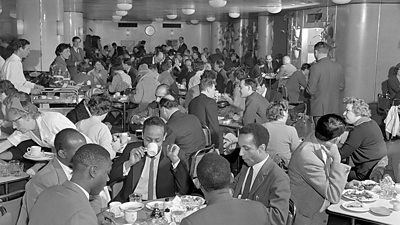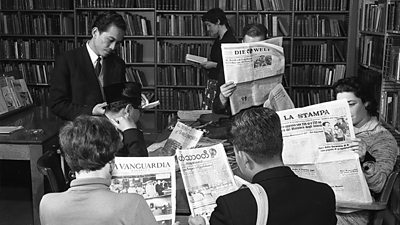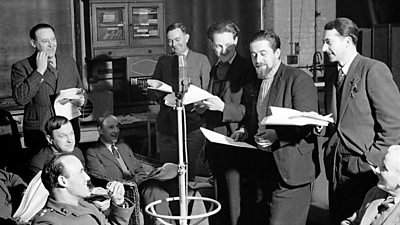Image: The broadcaster Karel Brusak outside Bush House in July 1956. He is remembered for his broadcasts to Czechoslovakia during WW2 and the Cold War.
Over the last nine decades ±«Óãtv broadcasts on radio, television and now online have helped to reflect British national identity. From news, drama and sport, to education, religion and comedy, ±«Óãtv programmes have painted a vivid and evolving picture of life in Britain for domestic, as well as international, consumption.
And yet, for much of that time the ±«Óãtv’s reputation as a broadcaster, particularly in its overseas services, has been built on the programme-making abilities and cultural sensibilities of its cosmopolitan staff, drawn from across the globe. So, how did the ±«Óãtv become a united nations of broadcasting?

As with so much else, the Second World War gave the ±«Óãtv a truly global dimension and, crucially, attuned the Corporation more acutely to the broadcasting needs of its overseas listeners. In turn, this required deploying staff that understood and were sensitive to audience tastes and tolerances.
This was the case for George Ivan Smith who was seconded to the ±«Óãtv from the Australian Broadcasting Corporation (ABC) in 1941, becoming Director of the Pacific Service. In an interview for the ±«Óãtv Oral History Collection Ivan Smith recalled how:
"somewhere in the ±«Óãtv higher echelons it was decided that they should strengthen their output, knowledge of the target audience, by bringing people from overseas... So they gathered together people who had detailed knowledge of the broadcasting techniques and idioms in Empire countries."

Meanwhile, the explosion in foreign language broadcasting completely altered the linguistic and cultural make-up of the ±«Óãtv. For the historian Alan Bullock, who had joined the European Services, it was an extraordinary change:
"You must remember there were hundreds of people employed, it was a very exciting world to belong to... I mean, you could eat for a month in the canteen and never sit with the same group of people, and I think it was a very exciting place, an absolutely absorbing place."
For some overseas nationals, however, initiation into the ±«Óãtv was not as straightforward as it might otherwise have been. Ferenc Rentoul, who after the war would take charge of the ±«Óãtv’s Hungarian Section, was initially required to register for "war work" and when Hungary joined the Axis Powers in 1940 faced internment as an enemy alien:
In 1940, the ±«Óãtv’s European Services moved to Bush House, which over the coming years housed all overseas broadcasting as the iconic headquarters of the ±«Óãtv World Service. It quickly became, as Ferenc Rentoul described, "a sort of intellectual Tower of Babel", where a world in miniature would meet to discuss, interpret and broadcast the day’s news and views to a global audience.
It is a compelling example of the vital importance of migrant and émigré contributions to the British "national interest". For Gerard Mansell, who would later be in charge at Bush House, the multi-cultural atmosphere of the ±«Óãtv continued to be central to its identity after the war:
The intense concentration of international staff at the ±«Óãtv had a profound effect not just on the Corporation’s own cosmopolitan identity, but on the ways in which the ±«Óãtv understood the attributes of its audiences and provided for their needs. Neither were they confined to the overseas services, with many making a significant and enduring contribution to ±«Óãtv home services.
The New Zealander Tahu Hole, for example, who joined the staff in 1943, took charge of the ±«Óãtv’s domestic news from 1948, including the subsequent inauguration of television news. Meanwhile, the Hungarian-born Martin Esslin, who had arrived at the ±«Óãtv Monitoring Service in 1940 before moving to the European Services, led ±«Óãtv Radio Drama from 1963 during a critical phase in its history: establishing a "National Theatre of the Air".
During his time in the European Services, Esslin was nevertheless conscious of tension between international staff and the British management that ran the language services. Procedures to ensure wartime editorial control as well as a sense of innate elitism characterised what he described as "the superiority of the British": where Language Supervisors with a censor button sat in on transmissions and English-language staff wrote the scripts that their overseas counterparts translated and read out on the air.
Meanwhile, the ±«Óãtv was particularly worried by the prospect of being seen simply as a hostile émigré station, with the danger that its reputation for impartiality would be compromised. Later, Alexander Lieven, who became head of the European Services in 1972, described Bush House as a "special place" that had "very little room for extremists", indicating an atmosphere that had adapted to these concerns.
Moreover, it was a place that accommodated people across a wide spectrum of personal and ideological beliefs, without distorting programme output:
If the growth of overseas and foreign language broadcasting during the Second World War made the ±«Óãtv World Service the organisation we recognise today, then its international and émigré staff were crucial in making that possible.
Providing the means by which the ±«Óãtv was able to speak to people around the world in their own language was only part of the job they did. More than translating scripts, the ±«Óãtv’s international workforce translated cultures, bringing Britain closer to the world and vice versa.
Engaging audiences, within their own cultural idioms, has proved to be one of the vital ingredients of the ±«Óãtv’s continuing international reputation and credibility.
The Australian Connection
-

The Australian Connection
The ±«Óãtv has had a decades-long and deep relationship with broadcasting in Australia. And, as Jeannine Baker shows, it’s been nurtured by a steady flow of key people back-and-forth - and was never entirely one-way traffic.

